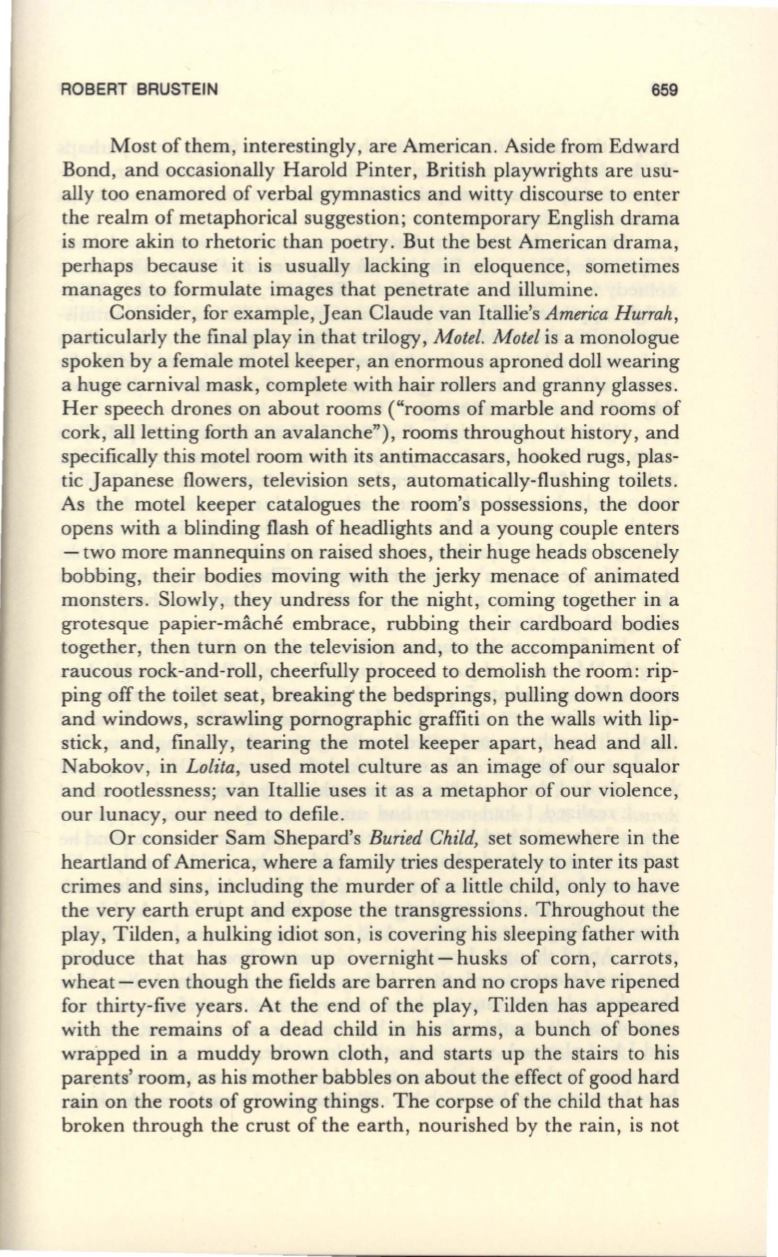
ROBERT BRUSTEIN
659
Most of them, interestingly, are American . Aside from Edward
Bond, and occasionally Harold Pinter, British playwrights are usu–
ally too enamored of verbal gymnastics and witty discourse to enter
the realm of metaphorical suggestion; contemporary English drama
is more akin to rhetoric than poetry. But the best American drama,
perhaps because it is usually lacking in eloquence, sometimes
manages to formulate images that penetrate and illumine.
Consider, for example, Jean Claude van Itallie's
America Hurrah,
particularly the final play in that trilogy,
Motel. Motel
is a monologue
spoken by a female motel keeper , an enormous aproned doll wearing
a huge carnival mask, complete with hair rollers and granny glasses .
Her speech drones on about rooms ("rooms of marble and rooms of
cork, all letting forth an avalanche"), rooms throughout history, and
specifically this motel room with its antimaccasars, hooked rugs, plas–
tic Japanese flowers, television sets, automatically-flushing toilets .
As the motel keeper catalogues the room's possessions, the door
opens with a blinding flash of headlights and a young couple enters
-two more mannequins on raised shoes, their huge heads obscenely
bobbing, their bodies moving with the jerky menace of animated
monsters. Slowly, they undress for the night, coming together in a
grotesque papier-mache embrace , rubbing their cardboard bodies
together, then turn on the television and, to the accompaniment of
raucous rock-and-roll, cheerfully proceed to demolish the room: rip–
ping off the toilet seat, breaking the bedsprings, pulling down doors
and windows, scrawling pornographic graffiti on the walls with lip–
stick, and, finally, tearing the motel keeper apart , head and all.
Nabokov, in
Lolita,
used motel culture as an image of our squalor
and rootlessness ; van Itallie uses it as a metaphor of our violence,
our lunacy, our need to defile .
Or consider Sam Shepard's
Buried Child,
set somewhere in the
heartland of America, where a family tries desperately to inter its past
crimes and sins, including the murder of a little child, only to have
the very earth erupt and expose the transgressions . Throughout the
play, Tilden, a hulking idiot son, is covering his sleeping father with
produce that has grown up overnight- husks of corn, carrots,
wheat- even though the fields are barren and no crops have ripened
for thirty-five years . At the end of the play, Tilden has appeared
with the remains of a dead child in his arms, a bunch of bones
wra.pped in a muddy brown cloth, and starts up the stairs to his
parents' room, as his mother babbles on about the effect of good hard
rain on the roots of growing things. The corpse of the child that has
broken through the crust of the earth, nourished by the rain, is not


